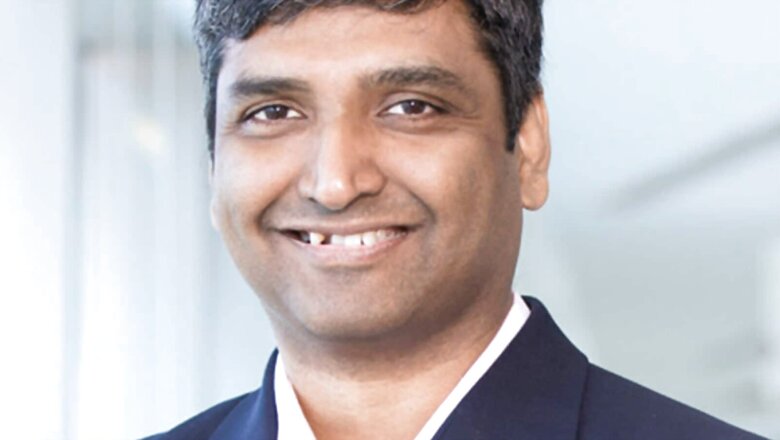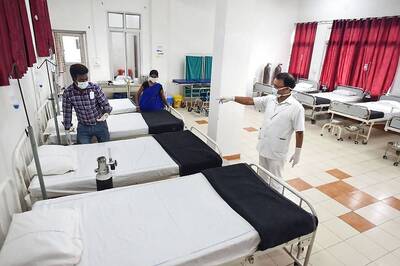
views
Swiss drugmaker Roche plans to launch a drug for a rare autoimmune disorder, neuromyelitis optica spectrum disorder (NMOSD), in India by next year, the company’s country head told News18.com.
The pharma giant also plans to go big on precision medicine in India. Precision medicine, also known as personalised medicine, is a kind of medicine that uses information about a person’s own genes to prevent, diagnose, or treat disease.
“We will be entering into neuromyelitis optica (NMOSD) and precision health products…we will be launching two new products in the area of precision health,” V Simpson Emmanuel, managing director and CEO, Roche Pharma India, said in an exclusive interview with News18.com.
“These (precision medicines) are for very very specific mutations and it’s transformational in terms of the response rate,” Emmanuel said.
“Interesting times ahead,” he said while adding that it is basically how healthcare and science are evolving over a period of time.
NMOSD is a rare, lifelong, and debilitating autoimmune disease of the central nervous system, primarily damaging the optic nerve or nerves and spinal cord.
According to Roche, the disease affects around 200,000 people worldwide and is most common among women, affecting people in the prime of their lives, usually in their 30s and 40s.
The company also plans to bring products in ophthalmology as well as more products in oncology and haematology segments in India. Also, in line with the portfolio expansion, the company launched the anti-cancer drug Phesgo – the world’s first ready-to-use injection, combining two monoclonal antibodies.
“Plenty of new launches which have happened… We have a huge focus on India. We are performing well in terms of our plans with respect to our product launches and new portfolios,” Emmanuel said.
Roche’s tocilizumab injection, sold under the brand name Actemra, was in high demand during the Covid-19 outbreak.
“We accelerated the supplies and increased the supplies of Actemra which was needed during Covid. We also launched the only antibody cocktail which was launched in India at that point in time and this was launched in 27 days. We also responded very fast to the needs of the market at that point in time,” said Emmanuel, who is known for his extensive experience of over two decades in the pharmaceutical industry.
‘Future of medicine – AI, algorithms & big data’
“When we are talking about India, I think we are sitting on a very unique opportunity (because) we have a huge population which also means that you have a huge volume of data that is available,” said Emmanuel.
He further said that “as much as we can talk about the various developments which are happening in the West in terms of artificial intelligence (AI) and algorithms, the amount of nuances which you would see with the kind of cultural diversity that we have in India, it is just tremendous.”
Two key things that he’s been observing, said Emmanuel, are “how data would play an important role in terms of our decision making and how it would transform the way in which we will start making decisions.”
According to Emmanuel, the amount of innovation that is happening in the understanding of our bodies or innovation in healthcare, the knowledge doubling is faster than ever. While earlier if it took 50 years, it was reduced to five years and then to just seven days.
“Now we are talking about 72 hours… Nobody can keep pace with that kind of knowledge… The question is how do you find the needle out of the haystack? How do you retrieve the right information which is relevant for a type of patient or disease with all the information available?” he said. “I think that’s where the science will evolve, in terms of how you get out from the wealth of data… the meaningful data… from data to insight and from insights to taking actions… That’s gonna be the next logical sentence and you will start seeing intervention becoming more and more personalised.”
He believes that in the coming years, we will move away from the general, standard protocols to very customised solutions. “So that’s where science is moving. And of course, there are a lot of things happening in the Indian ecosystem to support this and we are actually having a very good opportunity.”
Roche’s unique operating model in India
According to Emmanuel, Roche has changed its operating model and structure in India which has made the company “a completely decentralised and location-agnostic” organisation.
“We have a very, very different operating model for a pharmaceutical organisation. So, India is actually divided into 10 parts as clusters,” he revealed.
Each of them operates as an independent unit and they also have a leadership team based out of that particular respective geography.
“So it’s a self-constrained ecosystem where you have medical marketing and all these enabling functions being based as a part of that particular local geography, which is very unlike any other pharmaceutical structure at this point of time,” he said.
In fact, Emmanuel said, the company doesn’t have a “traditional head office” here and the leadership team is also distributed across the country. “The concept is that we need to be as close to the customers as possible. And for a very diverse country like India, you need to have very customised solutions…It’s not a regular approach that we are following and this is very unique to what we are doing as an organisation,” he claimed.
Blue Tree programme
Roche’s Blue Tree programme is a flagship patient support plan which was launched initially for only cancer patients in March 2015.
The intent of the programme is to support patients at every step of their journey – from safe diagnosis to thorough treatment to the completion of treatment. It also covers various aspects of the challenging journey, which is for both the patients as well as for their families.
The programme provides services about diagnostic support, information support, discussions on sources of funding, therapy and follow-ups among other services. The company also has funding mechanisms like private mortgage insurance options.
The company, this week, has announced plans to extend the programme to support other therapy areas than oncology which includes spinal muscular atrophy and haemophilia.
“What we have done today and what’s actually going to be different from what we have is that we have launched the digitally enabled, smarter, avatar of The Blue Tree. This is in fact like any programme, which has to keep up with the changing times and the changing behaviour patterns,” said Emmanuel.
He explained that now everything will become virtual where the patient or his family can actually load all the documents into the mobile app for the enrolment process and everything can happen through the mobile application itself rather than calling up a call centre and trying to fix up an appointment, etc.
“All of that can happen through an app itself right now,” he said while claiming that over the years, the programme has impacted more than 11,000 patients.
Read all the Latest India News here

















Comments
0 comment